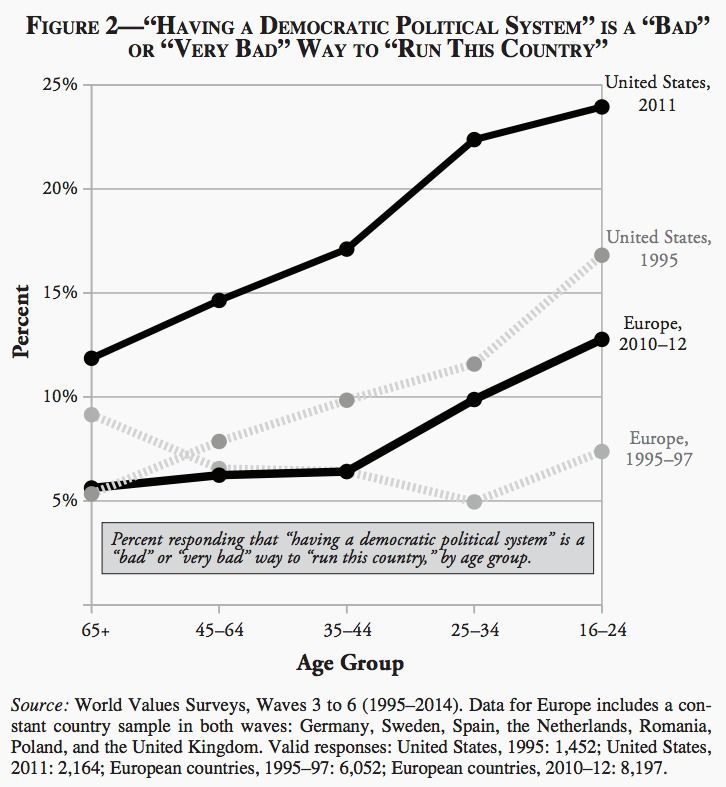Fed up—or giving up? People everywhere are down on democracy. Especially young people.



Source: Harvard research suggests that an entire global generation has lost faith in democracy. — Quartz
Fed up—or giving up? People everywhere are down on democracy. Especially young people.



Source: Harvard research suggests that an entire global generation has lost faith in democracy. — Quartz
Effective altruism and existential risk reduction face a single point of failure: they depend on civilization. Risks to civilization endanger effective altruism, existential risk reduction, and all significant humanitarian causes.
When you take the long view, civilizational collapse happens all the time. In contrast, many existential risks are speculative or rare: either they have never happened before, like nanotechnology weapons, or they are extremely uncommon, like large asteroid strikes.
You invest in the things you value, but you also need to be investing in the thing that lets you pursue your values in the first place: civilization.
When will tech solve the real problems, critics ask? … Assuming that this complaint is sincere, it nonetheless misses the point. What are “real” problems? … It’s a convoluted way of saying that the author wants to deputize Google, Facebook, Apple, and other tech companies to solve social problems.
Tech critics should be very careful what they wish for when they say that they wish that tech companies would tackle the “real” problems. What they are asking for is for tech companies to engineer solutions to social problems, and in particular they are asking for the top-down engineering of solutions to social problems by experts, bureaucrats, scientists, and engineers. This rational design process does not generally improve intractable social problems in flawed systems and if anything is the source of new problems.
a key characteristic of many social problems is a basic disagreement about what to measure and how to measure it.
it is also amusing that the call for the tech world to save us occurs at a time of popular panic over artificial intelligence. … There is a danger from a superintelligent, hyper rational, paperclip optimizing artificial intelligence. … Actually, it’s already taken control. … Yes, dear reader, I speak of the federal government.
…
The bureaucratic dimension of technical rationality can be considered a kind of artificial superintelligence, at least because most of people’s nonsensical fantasies of superpowerful, superintelligent, and hyper-rational beings tend to describe what already exists in large, impersonal bureaucracies. The pathologies of technical rationality are in fact the nightmare scenario that Musk and Hawking so fear.
The manner in which tech makes a difference or deals with a hard problem is important, and the mere fact that some tech company or funding agency for a technical project is tackling a hard problem that matters does not inherently make it a Good Thing (TM).
Source: The Manhattan Project Fallacy
“Normal,” as a concept, matters. The old adage that it is just the setting on a dryer is not just wrong but misleading. When something is abnormal it is important to understand why.
Michel Martin reflects on the divides that seemed particularly prevalent during and after the 2016 election, and what comes next.
Restructuring is something you read about. It’s a layoff when it’s happening to you. Somebody can tell you 24 hours a day that technology and globalization brings more goods at lower prices, but if you’re on the losing end of it, so what?
But it doesn’t matter if you correctly diagnose a problem if the prescription is all wrong.
it has been and remains so unproductive to focus on perceived enemies rather than real problems, no matter how deplorable or alien you think the enemy may be.
Let’s hope for the body politic that the diagnosis and the treatment are worthy of the pain.
Source: Healing The Wounds Of The Election Will Take Time : NPR